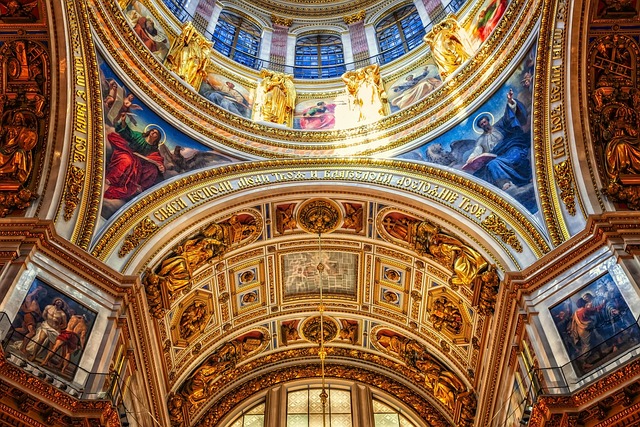Orthodox Christians pray to God, specifically to the Holy Trinity, which consists of God the Father, God the Son (Jesus Christ), and God the Holy Spirit.
Table of Contents
Understanding the Role of Saints in Orthodox Prayers
Orthodox Christianity is a rich and ancient tradition that has captivated the hearts and minds of millions of believers around the world. One of the distinctive aspects of Orthodox worship is the prominent role that saints play in the prayers and devotions of the faithful. But who exactly do Orthodox Christians pray to when they invoke the intercession of these holy men and women?
In Orthodox theology, saints are seen as friends and helpers in our journey towards God. They are not worshipped as gods themselves, but rather revered as examples of faith and righteousness. When Orthodox Christians pray to saints, they are seeking their prayers and support, much like asking a friend to pray for them.
The saints are believed to be alive in Christ, even after their physical death. They are seen as part of the “communion of saints,” a spiritual bond that unites all believers, both living and departed. This belief is rooted in the understanding that death does not separate us from the love of God, but rather brings us into a closer relationship with Him.
Orthodox Christians believe that the saints, being close to God, have a special ability to intercede on our behalf. Just as we might ask a friend or family member to pray for us, we can ask the saints to pray for us as well. This belief in the intercession of the saints is based on the biblical teaching that the prayers of the righteous are powerful and effective.
When Orthodox Christians pray to saints, they often use a specific form of prayer called an “akathist.” This is a hymn or poem that praises the saint and asks for their prayers. The akathist is a beautiful and poetic expression of devotion, and it helps to create a sense of connection and intimacy with the saint.
It is important to note that Orthodox Christians do not pray to saints in the same way that they pray to God. Prayer to God is seen as a direct and personal conversation with Him, while prayer to saints is seen as a request for their intercession. The saints are not seen as rivals or competitors to God, but rather as fellow members of the body of Christ who can help us on our spiritual journey.
The veneration of saints is deeply rooted in the history and tradition of the Orthodox Church. From the earliest days of Christianity, believers have looked to the saints as examples of faith and holiness. The lives of the saints are filled with stories of courage, sacrifice, and devotion, and they serve as a source of inspiration and encouragement for all believers.
In Orthodox worship, icons of saints are often displayed prominently in churches and homes. These icons are not worshipped, but rather venerated as windows into the spiritual realm. They serve as reminders of the presence and intercession of the saints, and they help to create a sense of sacred space and time.
In conclusion, the role of saints in Orthodox prayers is one of intercession and support. Orthodox Christians do not pray to saints as gods, but rather seek their prayers and assistance in their journey towards God. The saints are seen as friends and helpers, examples of faith and righteousness who can guide and inspire us. Through the veneration of saints and the use of prayers and hymns, Orthodox Christians create a sense of connection and intimacy with these holy men and women. The saints are not rivals to God, but rather fellow members of the body of Christ who can help us on our spiritual journey.
Exploring the Concept of Intercession in Orthodox Prayer

Orthodox Christianity is a rich and ancient tradition that has been practiced for centuries. One of the most important aspects of Orthodox worship is prayer. But who do Orthodox Christians pray to? This question may seem simple, but the answer is actually quite complex. In Orthodox theology, prayer is seen as a means of communication with God, and it is through prayer that believers seek intercession from the saints.
Intercession is a concept that is central to Orthodox prayer. It is the idea that the saints, who have lived holy lives and are now in the presence of God, can intercede on behalf of believers. This means that when Orthodox Christians pray, they are not only speaking directly to God, but they are also asking the saints to pray for them.
This concept of intercession can be a bit confusing for those who are not familiar with Orthodox theology. After all, why would someone pray to a saint when they can pray directly to God? The answer lies in the belief that the saints, being in the presence of God, have a special closeness to Him. They are seen as powerful intercessors who can bring the prayers of believers before God.
When Orthodox Christians pray, they often ask for the intercession of specific saints. These saints are believed to have particular areas of expertise or patronage. For example, someone who is sick might pray to Saint Panteleimon, the patron saint of healing. Or someone who is struggling with a difficult decision might pray to Saint Xenia, the patron saint of hospitality and guidance.
But it’s important to note that Orthodox Christians do not worship the saints. Worship is reserved for God alone. Instead, the saints are venerated and honored for their holy lives and their closeness to God. They are seen as examples of faith and devotion, and their intercession is sought as a way to draw closer to God.
In Orthodox prayer, there are also prayers of thanksgiving and praise. These prayers are directed solely to God and are a way of expressing gratitude for His blessings and acknowledging His greatness. Orthodox Christians believe that God is the source of all good things and that it is through His grace that they are able to live a life of faith.
So, who do Orthodox Christians pray to? The answer is both simple and complex. They pray to God, seeking His guidance, forgiveness, and blessings. But they also ask for the intercession of the saints, believing that their prayers can bring them closer to God. It is a beautiful and deeply spiritual practice that is at the heart of Orthodox worship.
In conclusion, Orthodox Christians pray to God and seek the intercession of the saints. Prayer is seen as a means of communication with God, and the saints are believed to have a special closeness to Him. While the concept of intercession may be confusing to some, it is a central aspect of Orthodox theology and a way for believers to draw closer to God. So, the next time you see an Orthodox Christian praying, remember that they are not only speaking to God, but they are also asking the saints to pray for them.
The Significance of Icons in Orthodox Prayer Practices
When it comes to Orthodox prayer practices, icons play a significant role. These religious images are not mere decorations but are considered windows to the divine. They serve as a visual aid to help believers connect with the spiritual realm and deepen their prayer experience.
In the Orthodox tradition, icons are not worshipped, but venerated. This means that they are treated with great respect and honor, as they are believed to be a means of encountering the presence of God. Icons are often placed in prominent locations within churches and homes, serving as focal points for prayer and meditation.
The use of icons in Orthodox prayer practices can be traced back to the early Christian Church. In the early centuries, when many people were illiterate, icons served as a way to teach and convey the stories of the Bible. They were used to depict scenes from the life of Christ, the Virgin Mary, and the saints, allowing believers to visually connect with these sacred figures.
Icons are not seen as mere representations of the divine, but as windows to the spiritual realm. Orthodox Christians believe that through prayer and contemplation before an icon, they can enter into a deeper communion with God. Icons are seen as a means of bridging the gap between the earthly and the heavenly, allowing believers to experience a glimpse of the divine presence.
When Orthodox Christians pray before an icon, they are not praying to the physical image itself, but to the person or saint depicted in the icon. Icons are seen as a way to connect with the saints and ask for their intercession. Just as one might ask a friend or family member to pray for them, Orthodox believers ask the saints to pray on their behalf.
The veneration of icons is not limited to the saints alone. Icons of Christ and the Virgin Mary hold a special place in Orthodox prayer practices. These icons are considered to be particularly powerful in facilitating a connection with the divine. They are seen as windows to the divine presence, allowing believers to encounter the love and grace of God.
Orthodox Christians often use icons as aids in their personal prayer practices. They may light candles before an icon, offering their prayers and intentions as the flame flickers. Some believers may also kiss or touch the icon as a sign of reverence and devotion. These physical acts serve as a tangible expression of their faith and help to deepen their connection with the divine.
The significance of icons in Orthodox prayer practices cannot be overstated. They are not mere decorations but are considered sacred objects that facilitate a deeper communion with God. Icons serve as visual aids, allowing believers to connect with the spiritual realm and seek the intercession of the saints. Through prayer and contemplation before an icon, Orthodox Christians can experience a glimpse of the divine presence and deepen their relationship with God.
Unveiling the Mystery of the Holy Trinity in Orthodox Prayers
Have you ever wondered who Orthodox Christians pray to? The answer may surprise you. Orthodox Christians believe in the Holy Trinity, which consists of God the Father, God the Son (Jesus Christ), and God the Holy Spirit. This concept can be a bit confusing, but let’s delve into it and unveil the mystery of the Holy Trinity in Orthodox prayers.
When Orthodox Christians pray, they address their prayers to God the Father. He is seen as the creator of the universe and the source of all life. In Orthodox theology, God the Father is often depicted as a loving and compassionate figure, who cares deeply for His creation. When Orthodox Christians pray to God the Father, they seek His guidance, protection, and blessings.
But what about Jesus Christ? Orthodox Christians also pray to Him. They believe that Jesus is not only the Son of God but also fully divine. In Orthodox theology, Jesus is seen as the savior of humanity, who came to earth to redeem us from sin and death. When Orthodox Christians pray to Jesus, they seek His forgiveness, mercy, and salvation. They also ask for His intercession on their behalf, believing that He has the power to grant their requests.
The third person of the Holy Trinity is the Holy Spirit. Orthodox Christians also pray to the Holy Spirit, seeking His guidance, wisdom, and strength. They believe that the Holy Spirit is present in their lives, guiding them in their spiritual journey and helping them grow closer to God. When Orthodox Christians pray to the Holy Spirit, they ask for His presence and power to be with them, enabling them to live a life that is pleasing to God.
So, when Orthodox Christians pray, they address their prayers to God the Father, God the Son (Jesus Christ), and God the Holy Spirit. They believe that all three persons of the Holy Trinity are equally divine and worthy of worship. This belief is deeply rooted in the teachings of the early Church and has been passed down through generations of Orthodox Christians.
It is important to note that Orthodox Christians do not see the Holy Trinity as three separate gods, but rather as one God in three persons. This concept can be difficult to grasp, as it goes beyond human understanding. However, Orthodox Christians believe that the Holy Trinity is a mystery that can be experienced and known through faith.
In Orthodox prayers, you will often hear phrases such as “Glory to the Father, and to the Son, and to the Holy Spirit” or “In the name of the Father, and of the Son, and of the Holy Spirit.” These phrases serve as a reminder of the belief in the Holy Trinity and the unity of the three persons.
So, the next time you come across an Orthodox Christian praying, remember that they are addressing their prayers to God the Father, God the Son (Jesus Christ), and God the Holy Spirit. They believe in the Holy Trinity, a mystery that is at the core of their faith. And through their prayers, they seek to deepen their relationship with God and experience His love and grace in their lives.
Conclusion
In conclusion, Orthodox Christians pray to God, specifically to the Holy Trinity consisting of God the Father, God the Son (Jesus Christ), and God the Holy Spirit.
For licensing reasons, we must provide the following notice: This content was created in part with the help of an AI.


